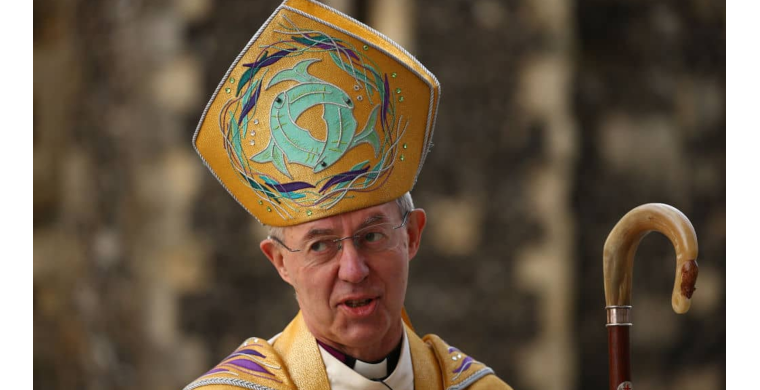The problem with Justin Welby's environmentalism
By Andrew Tettenborn
https://www.spectator.co.uk/
9 August 2022,
There is an excellent religious case to be made for environmentalism. Roger Scruton ten years ago made the point that a 'natural piety' is inherent in most of us. Scruton argued this was a call to be responsible for the environment and urged us to love the earth and not to exploit it. This argument sweetly slips into theological terms. The earth is not there to satisfy as many of our crass secular desires as possible ,it is there to give us -- and very importantly our descendants -- the opportunity to be closer to God, be this moral, aesthetic or otherwise.
Justin Welby, nominal head of the Anglican communion, is undoubtedly on board with environmentalism. He made this clear in a keynote speech on Sunday at the Lambeth Conference. Unfortunately, if you expected him to put the religious argument for environmentalism at the forefront of his speech, you would be disappointed. His approach was rather different. It was all a matter, he said, of an unjust society and the need to deal with it. The church's function was, we were told, to 'seek to transform unjust structures of society, to challenge violence of every kind and to pursue peace and reconciliation.' On the environment this came down, broadly, to differences in wealth and other inequalities. Our current environmental woes are the fault of rich countries, who he said had 'declared war on God's creation' in the past and now continued, while they dumped refuse in the oceans, to tell poor nations not to use carbon generating fuels and discover new paths in order to enable the rich to remain rich. His answer? Recognise a climate emergency and insist on urgent action on it, especially in Britain and the west.
This sounds good, and certainly few disagree that as far as possible we must all do our bit to limit global warming. But if you dig below the surface, any reader, and certainly any worshipper, should perhaps be a little sceptical.
For one thing, Welby is quietly seeking to run together two ideas -- a radical egalitarian attack on 'unjust structures' and environmental activism -- as if they were much the same, and as if promoting the former was the key to the latter. But this is not necessarily so.
Take the implication that climate action is the responsibility of rich countries emitting more than their fair share of pollution with poor ones continuing to emit less. This statement is partly true. But it is a very partial truth. Rich countries are not all at the top of the CO2 league, nor poor countries all at the bottom. In 2019, for example, the UK ranked roughly forty-first in consumption-based emissions per capita: below Botswana, Lithuania, Iran, Slovakia, Russia and Oceania, and above rich France and seriously wealthy Sweden. It is also worth noting that rich countries in general do more by way of legislation and government initiatives effectively to reduce emissions. In the 20 years to 2019 the US, the EU and the UK all appreciably reduced their emissions, while China, India and Brazil increased their emissions and are likely to continue to do so. In this instance, you can have redistribution between rich and poor, or you can have environmental improvement which benefits everyone. It is hard to see how you can have both at the same time.
Secondly, the veiled suggestion that Britain is a rich country and that its people must therefore confess their guilt and put up with a change to their lifestyle runs into a further problem. For all Welby's demands to dismantle unequal social structures, this is a call for measures that will disproportionately impact the poor. At a pinch the urban middle class can rip out gas boilers and invest in green heating; the church too will no doubt grit its teeth and divert funds that might otherwise have gone to pay for more priests to altering clergy housing (and bishops' palaces) in good green fashion. But suggest to a person in Dartford, Dudley or Darlington who is at present barely scraping by with difficulty that they must give up a heating system they know and like in favour of storage radiators or temperamental and expensive heat pumps, and you will get a dusty answer. Indeed, it's hard to think of anything better calculated to repress whatever goodwill the church still retains in less prosperous areas than the kind of posturing we saw at Lambeth.
But all this still leaves out the biggest problem with Welby's speech. In describing the environmental issue as one of economic and global inequality and the need to intervene for social change, it's not easy to see anything that is particularly Christian about the Archbishop's message. Apart from a rather wooden reference to 1 Colossians about Jesus having reconciled himself to 'all things', rather than just all people, Welby's environmentalism could very plausibly have come from a Liberal Democrat politician, or for that matter (especially with the mention of unjust structures) a postmodernist professor.
This point matters. As Edward Norman pointed out in his 1979 Reith lectures on Christianity and the World Order, much to the fury of liberation theologians and other fashionable ecclesiastics, a church turns from arguments based on the kingdom of heaven to those founded on secular political ideas at its peril. If archbishops talk in this way, substantial numbers of their flock, and certainly any potential converts, will undoubtedly begin to wonder whether it's necessary to bring God into the equation at all. And, in a sense, who can blame them if they do?
Andrew Tettenborn is a professor of law at Swansea Law School














